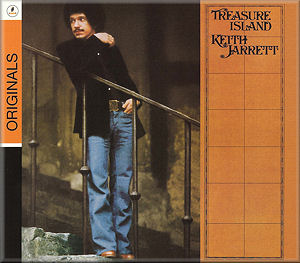- The Rich (And The Poor)
- Blue Streak
- Fullsuvollivus (Fools Of All Of Us)
- Treasure Island
- Introduction And Yaqui Indian Folk Song
- Le Mistral
- Angles (Without Edges)
- Sister Fortune
Keith Jarrett (piano, soprano saxophone, percussion); Dewey Redman (tenor saxophone);
Sam Brown (guitar); Charlie Haden (bass); Paul Motian (drums); Guilherme
Franco, Danny Johnson (percussion)
rec. 1974, NYC
Verve’s straight reissue of Treasure Island is a gatefold ‘original’
dating from 1974. It enshrines populist and funky grooves, as befits
the master communicator, but it does have Dewey Redman on board and
he adds an occasionally acerbic take on things, this grit sometimes
destabilising the workaday groove into which the music can sometimes
fall.
The first track establishes the ingratiating backbeat which fuses
with crypto Gospel and made up so important an element of Jarrett’s
piano styling, whether on a small or a larger canvass. Redman is in
blues mood, but some fatuous singing (Jarrett) diminishes enthusiasm.
This comedic element, or at least a modish equivalent, is no good
in Blue Streak where the Rhesus Monkey yelps are no help to
the samey vamps – and it is a vamp and not a tune, only saved by Redman’s
somewhat more active interventions. Jarrett’s lack of real direction
at this stage in his career can be inferred from the fatuity of Fullsuvollivus
(Fools Of All Of Us) where modish percussion swathes the relentless
piano in clattery, Latin American drizzle and ‘inspires’ Redman to
his dirtiest playing of the date so far.
Much better is the pretty country-road stylings of the title track
– and apart from the drowsy percussion, a danger point in the set,
it’s notable for a good, long Sam Brown guitar solo. Unfortunately
Le Mistral, which starts well, loses itself in abstruse waffle,
a pointless long bass solo and kitchen appliance percussion. The free
ethos is touched on in Angles (Without Edges) where Jarrett
plays soprano saxophone but the project is forced and wearisome. The
Jarrett groove is re-established in Sister Fortune but this
is little more than a Horace Silver rip-off. The groovy percussion
is already ten years out of date.
Haden and Motian are stalwarts of course but one can’t feel them
engaging with this set. It’s a session that lacks direction and focus,
swinging out in too many eclectic directions for comfort.
Jonathan Woolf
